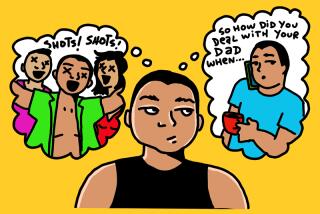Caring for an elderly relative
- Share via
A checklist for holiday visits
Things that could indicate a problem, according to Mary Twomey, co-director of the Center of Excellence on Elder Abuse & Neglect:
Confusion
Depression
Inability to handle meal preparation, house cleaning, laundry, bathing or timely bill payment
Overusing drugs or drinking too much
Frequent falls
Undernourishment, dehydration or signs of under-medication
Neglect or abuse is possible if your parent lives with others, or has a caregiver or other helper. Some things to watch for:
Caregiver who volunteers to help for little or no pay
Recent changes in banking or spending patterns
Caregiver isolates the older person from family and friends
Caregiver has problems with drugs, alcohol, anger management or emotional instability
Caregiver is financially dependent on the older person
Parent seems afraid of the caregiver or, alternatively, seems to have a new “best friend”
There are unexplained bruises or cuts
Parent has bed sores (pressure sores from lying in one place too long)
What should you do:
If you suspect your parent is at risk, call your local Adult Protective Services or Office on Aging or go to https://www.centeronelderabuse.org for more information.
If your parent seems to be declining, take steps to prevent serious accident and future health complications. Correcting problems can help keep the elderly safely in their homes.
Get in touch with responsible neighbors and friends. Give them your address and phone numbers in case of an emergency.
RESOURCES:
Eldercare Locator, (800) 677-1116, https://www.eldercare.gov, can help you determine which local agencies provide service where your parents live.
AARP, (888) 687-2277, provides worksheets on care giving and tips on long-distance issues.
Center of Excellence on Elder Abuse & Neglect, (714) 456-5530, www.centeronelderabuse.org, offers services and conducts research, training and advocacy on the issue of elder abuse and neglect.
—Rosemary McClure


